Background
Algernon Blackwood was born in 1869 to strictly religious parents who brought Blackwood up to believe deeply in personal salvation and “the heavy burden of sin” (S.T. Joshi, “Introduction,” Ancient Sorceries and Other Weird Stories by Algernon Blackwood viii). He eventually became deeply interested in pathology, psychology, and the occult, and would join the famous Hermetic Order of the Golden Dawn in 1900 and the Society for Psychical Research in 1888, allowing him to attend séances and investigate haunted houses (ix). However, for Blackwood, Nature (with a capital N) would become his own true form of mysticism, which he described as “the strongest influence in my life” (qtd. in Joshi viii). Many of his stories are thinly-veiled psychological self-portraits and/or are based on his extensive travels in nature.
Although his writing is extremely diverse, they are all linked in his depiction of awe and “pure horror” (xii). He also manages to imbue his work with a “portentous grandeur, as if the very fabric of the universe is involved” (ibid.).
Plot Summary
“Smith: An Episode in a Lodging House” is told through two narrative levels: first, an anonymous narrator recounts the story that a doctor tells of a man named Smith who lived in his apartment building when the doctor was a medical student. The doctor claims that he always felt that there was something strange and off about Smith. One night, he overhears Smith in his apartment, speaking with another person, with the sound of fear or danger in his voice. The doctor says that he knocked on Smith’s door, offering assistance, to which Smith responded that the doctor wouldn’t be able to help and that he’d be safer in his own apartment. From that night on, the doctor experienced the feeling that “the strange forces of his (Smith’s) atmosphere” invaded and filtered into his own “being” (5). One night, Smith appeared in the doctor’s apartment and asked whether the doctor is ever “disturbed at night” and encourages the doctor to let him know at once if that is ever the case (7). After Smith leaves, the doctor is aware that there is another presence in the room, watching him and almost touching him. He begins to feel that his “vitality” is being drained from his body. Smith appears again at the door, saying something in a commanding tone. The presence then leaves the apartment and the doctor hears Smith’s door slamming shut. The doctor sees a dark shadow leave his apartment with “more or less” a human head (9). The next day, Smith appears again in the doctor’s apartment and tells the doctor that it is his “amazing vitality” that causes him to be the target for these mysterious forces (11). About two or three weeks later, when the doctor is walking up the stairs late at night, he hears a voice shouting “Help! Help!” and feels a strange force clutching his arm (12). The doctor goes to Smith’s apartment, easily opens the door, and finds that the room is “full of choking vapour, moving in slow clouds” with “huge shadows passing in and out of the mist (ibid). In the middle of the room is a glowing circle made with black material. The doctor has an “impression” that the room is full of “people” but not “humans” (ibid.). Each of these beings carries a “vibrating centre” and depletes the doctor of his vitality whenever as they pass (13). Smith urges the doctor to pull him to the center of the circle, which he does, and Smith begins to make a noise, “his voice began to vibrate,” demonstrating his “genuine knowledge of the occult manipulation of sound,” and putting the room back to “silence and perfect order again” (14-15).
Notes & Quotes
- The beings in this story are similar to vampires in that they are able to deplete humans of their vitality and energy. Additionally, they are specifically attracted to the doctor because of his extraordinary vitality.
- Much like Dracula, there is a confrontation between the occult supernatural and science. Here, a doctor is forced to defend himself and his neighbor Smith from supernatural, unknowable beings. Additionally, the doctor states that he was, at the time of the incident, “in the heavy, unquestioning state of materialism which is common to medical students when they begin to understand something of the human anatomy and nervous system, and jump at once to the conclusion that they control the universe and hold it in their forceps the last word of life and death. I “knew it all,” and regarded a belief in anything beyond matter as the wanderings of weak, or at best, untrained minds” (5). Later, in the final act of the story, he admits that “I was face to face with a situation so utterly beyond my knowledge and comprehension that I felt as helpless as a child, and as useless” (13).
- The gothic atmosphere which Blackwood creates in this story is deeply reminiscent of both Poe and Lovecraft. Supernatural forces are able to touch and psychically invade both his home, body, and mind. In particular, his use of sound to ransmit the terror of the story to the reader and across the characters is very Poe-esque and makes this feel more American to me than British.
